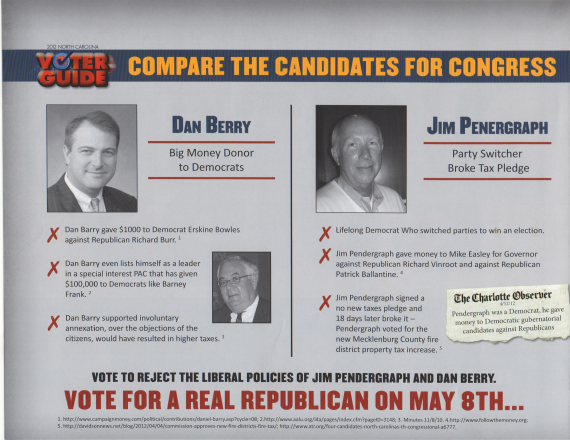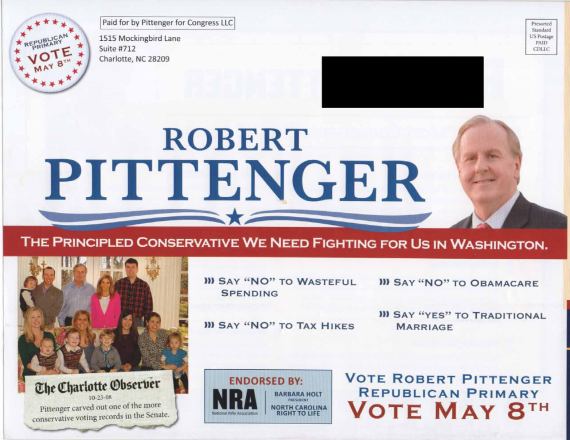In the final week of a hotly fought Republican primary in North Carolina, one congressional candidate accuses his rival — in a mailer sent to GOP voters — of being a “Big Money Donor” to Democrats. And he accuses another of breaking a tax pledge. But we find both claims by wealthy businessman and former state Sen. Robert Pittenger are off the mark.
In truth, financial adviser Dan Barry, the supposed “Big Money Donor,” contributed to 11 Republicans and only two Democrats in national races between 2003 and 2011. And a life insurance trade group with which Barry is affiliated — and similarly attacked in the mailer — has contributed to more Republicans than Democrats during the 2012 election cycle.
The other candidate, County Commissioner Jim Pendergraph, didn’t break a tax pledge — even according to the conservative group that sponsors the pledge. What he pledged to oppose were federal tax hikes — if he’s elected to Congress. As a county commissioner, Pendergraph recently approved a new tax to provide more fire service to unincorporated areas in Charlotte’s suburbs. His vote drew criticism — but not claims of broken promises — from the pledge group.

Pittenger also takes out of context statements from newspaper articles. For instance, the mailer attributes a statement Pittenger made at a debate to The Charlotte Observer.
And we can’t ignore the mailer’s incorrect spelling of Barry and Pendergraph — twice.
The winner of Tuesday’s primary almost certainly will become the district’s new House member. Voters in North Carolina’s 9th Congressional District have sent a Republican to the House for the last six decades, according to the Observer. The Cook Political Report does not list this race as competitive in November.
Pittenger has pumped $1.1 million (see page 30) of his own money into his campaign, which has raised $1.4 million (see page 3). That figure dwarfs Barry’s $302,000 and Pendergraph’s $173,000. Ten Republican candidates are vying for a chance to replace Sue Myrick, a nine-term congresswoman who is retiring.
Our thanks to Mark DiBiasio of Waxhaw, N.C., who emailed the flier to Spin Detectors, FactCheck.org’s project through which we ask our readers to help us monitor political claims and campaigns across the country. Spin Detectors noticed DiBiasio’s tweet about the mailer and asked him for a copy. DiBiasio is a Barry supporter and runs a local blog.
Partisan Paint Job
The mailer claims Barry is a “Big Money Donor to Democrats,” stating he “gave $1,000 to Democrat Erskine Bowles against Republican Richard Burr.” (Burr ultimately defeated Bowles in a 2004 Senate race.) But the vast majority of Barry’s contributions have filled Republican campaign coffers.
It’s true that Barry donated that much to Bowles, a former chief of staff to President Bill Clinton. And Barry contributed to the campaign of former South Carolina Rep. John Spratt, a Democrat. But all told, Barry has donated to 11 Republican House and Senate candidates between 2003 and 2011. Barry contributed to the campaigns of Republican Reps. David Camp, Eric Cantor, Sue Myrick, Paul Ryan and Pat Tiberi. He also put money behind Sens. Richard Burr, Lindsey Graham, Chuck Grassley, Orrin Hatch, Mitch McConnell and former Sen. John Ensign. Barry also gave money to The Freedom Project, a Republican political action committee.
Pittenger’s mailer also misleadingly singles out the Democratic Party donations made by a life insurance trade group with which Barry is affiliated.
Mailer: Dan Barry even lists himself as a leader in a special interest PAC that has given $100,000 to Democrats like Barney Frank.
That “special interest PAC” is the Association for Advanced Life Underwriting. Barry is a board member. The group’s political action committee donates to Republicans and Democrats alike. In fact, the Center for Responsive Politics — a nonprofit, nonpartisan research group that keeps track of money in U.S. politics — finds that the AALU has contributed more to Republicans than Democrats during the 2012 election cycle. The research group reports that 35 percent of AALU’s contributions have gone to Democrats while 58 percent of its donations supported Republicans. It’s true that the group gave money to Frank’s congressional campaign. But it also contributed to the campaign of Republican John Boehner, speaker of the House.
Pendergraph’s Pledge
Pittenger’s mailer claims Pendergraph broke his pledge to oppose tax increases when, as a county commissioner, he supported a “new Mecklenburg County Fire district property tax increase.” But the group to which Pendergraph made the pledge, Americans for Tax Reform, said Pendergraph didn’t break the pledge. The group, however, did question his vote.
As a congressional candidate, Pendergraph signed the Federal Taxpayer Protection Pledge, which would apply to his service as congressman if elected. In April, he voted ( see pages 7 to 9) for the creation of a new tax on properties in unincorporated areas to strengthen fire protection services. The new tax ranged from 4.5 cents to 7 cents per $100 of assessed value. The commissioner’s vote followed the recommendation of a county report, which found that the current fire service funding strategy was “unsustainable.”
In a blog post, Americans for Tax Reform criticized Pendergraph’s fire tax vote. But the group said he had not violated his tax pledge.
Americans for Tax Reform, April 30: The new tax is set to go into effect on July 1, 2012. While his vote was not a violation of the federal “no-tax increases” Pledge, his decision to support a tax hike on the local level should have voters questioning his dedication to them should he be elected to Congress.
Headline Hokum

The mailer also misleads by attributing Pittenger’s words to The Charlotte Observer.
The mailer truncates a sentence from the newspaper — leaving off the phrase “Pittenger replied” — and shows the words under the newspaper’s masthead, as if the paper made that statement. The publication was describing an exchange between Pittenger and Pendergraph during a sponsored debate. Here’s what the mailer said and what the Observer actually wrote.
Mailer: The Charlotte Observer (4/12/12) Pendergraph was a Democrat, he gave money to Democratic gubernatorial candidates against Republicans.
The Charlotte Observer: Pittenger replied that when Pendergraph was a Democrat, he gave money to Democratic gubernatorial candidates against Republicans.
The mailer’s front page takes another sentence from a newspaper article out of context, leaving out the fact that the Observer was being somewhat critical of Pittenger. It’s true, as the mailer states, that the paper said he “carved out one of the more conservative voting records in the Senate.” But the paper also described him as a “go-it-alone businessman in an environment that puts a premium on teamwork.”
Mailer: The Charlotte Observer (10-23-08) Pittenger carved out one of the more conservative voting records in the Senate.
The Charlotte Observer: He has been less effective at the inside game of cobbling together legislative proposals. That’s partly because Pittenger is a Republican in a Democratic-dominated legislature, but partly because he is a strong-willed, go-it-alone businessman in an environment that puts a premium on teamwork. Pittenger carved out one of the more conservative voting records in the Senate.
Given the mailer’s use of the newspaper’s name and content, we should also note that the Observer did not endorse Pittenger.
— Ben Finley